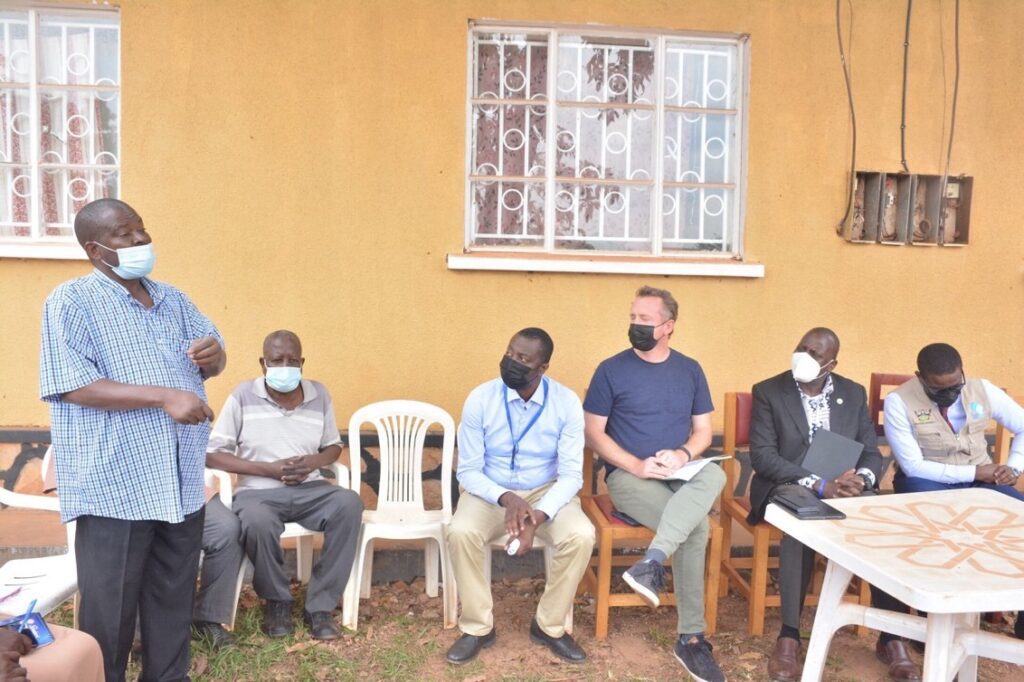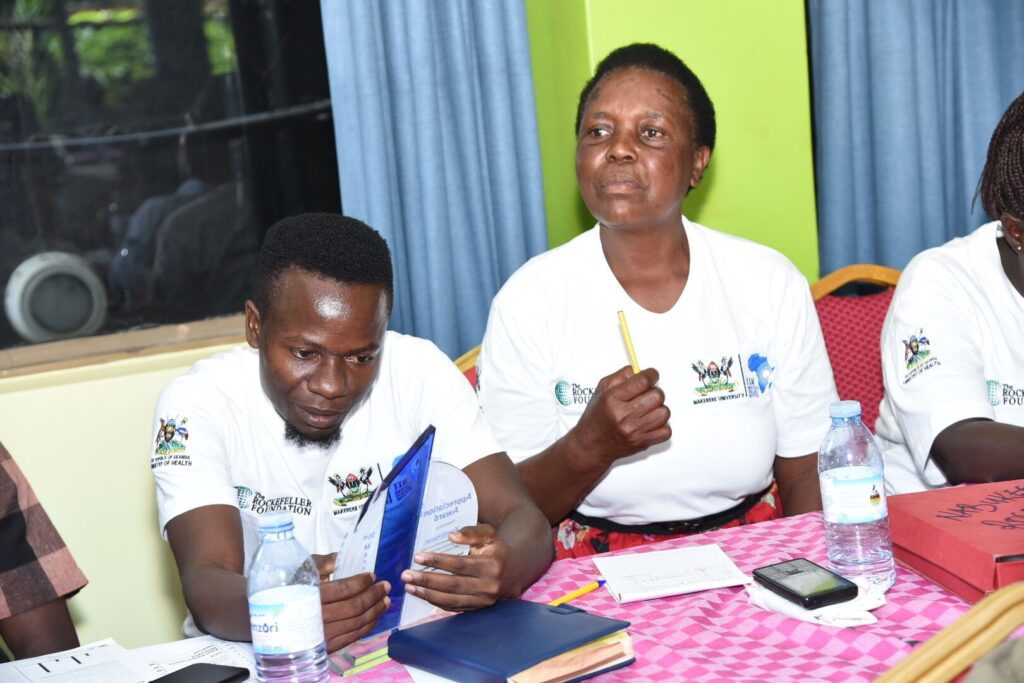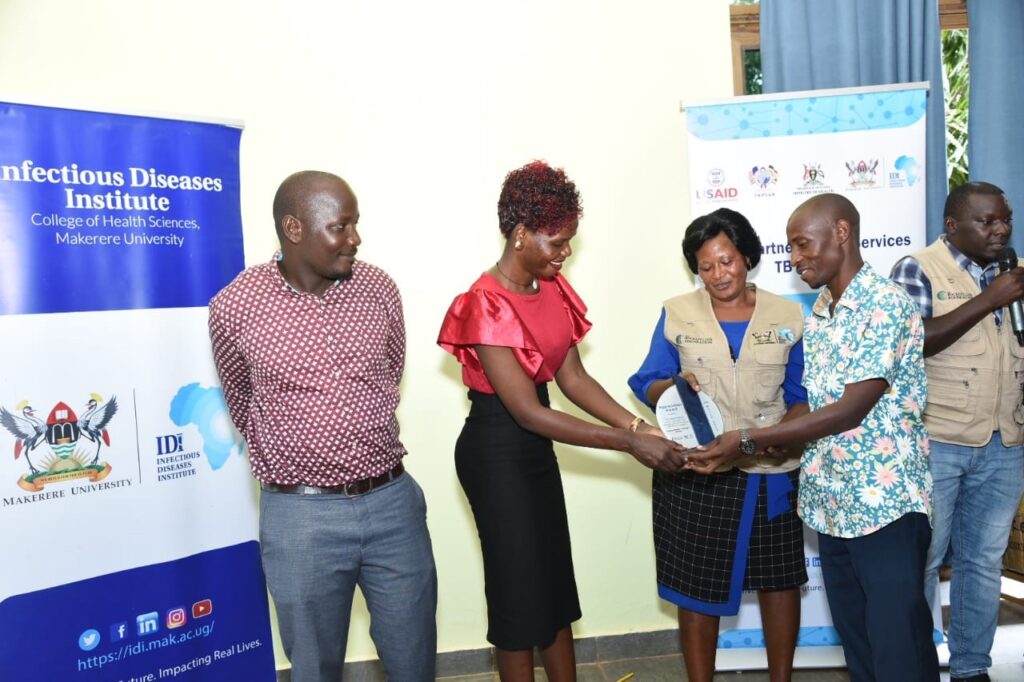Just before the Vaccination Action Network (VAN), the Infectious Diseases Institute (IDI) set out to advance a model addressing disparities in COVID-19 vaccine uptake in communities in Wakiso, a district in central Uganda. This was made possible by a donation from The Rockefeller Foundation. The approach focused on effective listening among vulnerable groups and service providers, including community volunteers and healthcare workers. It was soon realized that many changes had been made in response to COVID-19, including introducing trained surge staff and occasionally overriding the trusted old VHTs. It soon became clear that the factors influencing community health work are driven by passion and responsibility rather than monetary gain.
A Collaborative Approach: It is easier to hear it from our Trusted Community Health workers

Hassan, a celebrated vaccination champion in Bunamwaya, a village on the outskirts of Wakiso district in Uganda, has worked as a village health team volunteer for twenty-two years (22). He is dedicated to improving the health of his community, although he admits that his voluntary role has provided several opportunities to learn and share valuable lessons about community health; he also has walked many miles door-to-door and many hours of his life providing services without any compensation or facilitation.
As I listen to him speak, it becomes clear that the team members offer assistance out of pure love and compassion without being constrained by formal contracts. They rely on the strong bonds they have forged with the communities they serve, which testify to their unwavering commitment.
Each day, their sense of responsibility towards those they help grows exponentially. Their efforts have resulted in many heart-warming successes, such as helping a child who had never received any vaccination get their missed doses or referring an ill person to get proper healthcare.
What these individuals do isn’t merely a job but a sacred calling. Their unwavering commitment to serving others is a testament to their depth of character and dedication to their work.
Empowering Local Communities: A Time to Lead with Meaningful Recognition
Thanks to the kind support of the Rockefeller Foundation through Amref Health Africa, the IDI had the honour of prioritizing the recognition of exceptional vaccination champions. The IDI recognized that these champions are individuals who have gone above and beyond to promote vaccination within their communities. They have committed their time, energy, and resources to ensuring that the people around them are protected from vaccine-preventable diseases.
In recognition of their selfless efforts, the IDI awarded these champions in-kind awards. The awards were carefully designed to be expressive and meaningful, reflecting the importance of these champions’ work. The IDI recognized that these awards would not fully compensate for the efforts of these champions. Still, they hoped it would show some appreciation for their love and dedication to their communities.

In July 2023, we recognized 20 vaccination champions, with four from each of the five health sub-districts we supported. They were acknowledged at the quarterly district health assembly, which reviews performance. Each champion received a certificate of appreciation and a beautiful ceremonial plaque as a token of recognition for their outstanding efforts.

Six months later, What is the impression? Feedback on early successes
Although it was apparent that everyone was highly pleased with their recognition, we were curious to know how they felt about it more than six months later. We wanted to find out how it had impacted their work. So, we conducted a rapid assessment by speaking to 15 of the previously recognized vaccination champions to understand their thoughts and recommendations, and we received some interesting feedback. When asked about their feelings after being recognized as outstanding vaccination champions, 87% scored 10/10 on the honour scale, while the other 13% scored 9 out of 10.
“I felt good learning that my efforts were recognized, and I got encouraged to work harder.”
Community Health Worker, Kyadondo East Health sub-district Wakiso district
We further inquired How the recognition impacted their work, and their responses were largely the same: it had a positive impact! We thought it would be helpful to take the opportunity and seek recommendations for future attempts to reward outstanding champions in health service delivery. Although 4/15 (27%) of the responses recommended that a monetary benefit in addition to the appreciation plaque would be appreciated, none indicated that they would rather have money instead.
“We all want money, but as an individual, the award plaque caught me by surprise, and I hold it dearly in my heart. It continues to be a symbol of appreciation until today because it is in a special place in my house, and when guests come in, I attempt to tell them about it and relive the glory. No amount of money would have done that until now and This is one of the reasons why I continue to mobilize even without any facilitation to date.”
Hassan, VHT Kyadondo South Health sub-district Wakiso district
Health care Worker, Kyadondo North Health sub-district Wakiso district
“The award was a wonderful surprise. Front-line health care workers are never recognized like this. In the future, I wouldn’t mind having a check attached, but the Physical award plaque that I can keep and show off was unique and thoughtful for sure.”
Maureen, Health Care worker, Kyadondo South Health sub-district Wakiso district
“Recognizing me as an outstanding vaccination champion showed me that at least my effort is being recognized and valued, and my work is being appreciated. It was a surprise to me, and it gave me a zeal to work hard and put in more effort to achieve more. It was a sign that at least something had been well accomplished.
I also wish that the program could recognize more vaccination champions by giving them certificates and making them travel to different districts/ countries to share their experiences”.
Immaculate, EPI focal person, Busiro North Health sub-district Wakiso district
“On top of this kind of award, where possible, you could also consider taking the champions for a short course related to their field”.

In conclusion, it is undeniable that incentivizing non-monetary volunteering can have a meaningful and long-lasting effect on those we acknowledge, positively impacting their work. This act of humility can motivate exceptional community health champions to take pride in their voluntary service to their communities. Consequently, they may continue to serve their communities for longer periods and have a more positive impact on the public health outcomes of their communities.
Authors
- Boneventure Brian Kawere, Infectious Diseases Institute, GHSP-Makerere University School of Public Health
- Jackson Musembi, Amref Health Africa HQ -Global Health Security Unit
- Tonny Kapsandui, Amref Health Africa in Uganda
